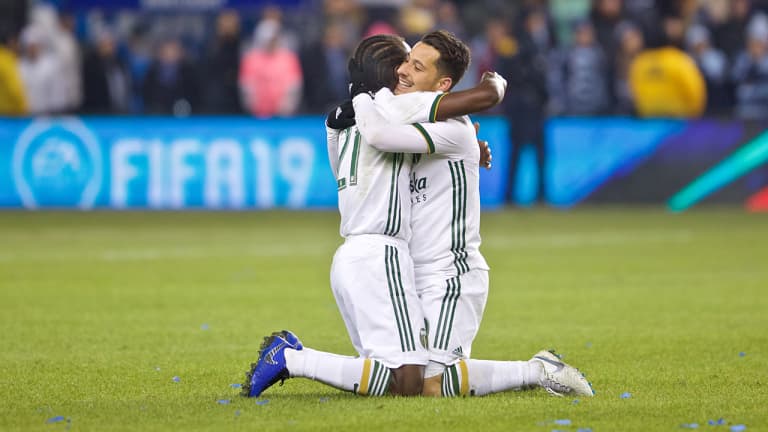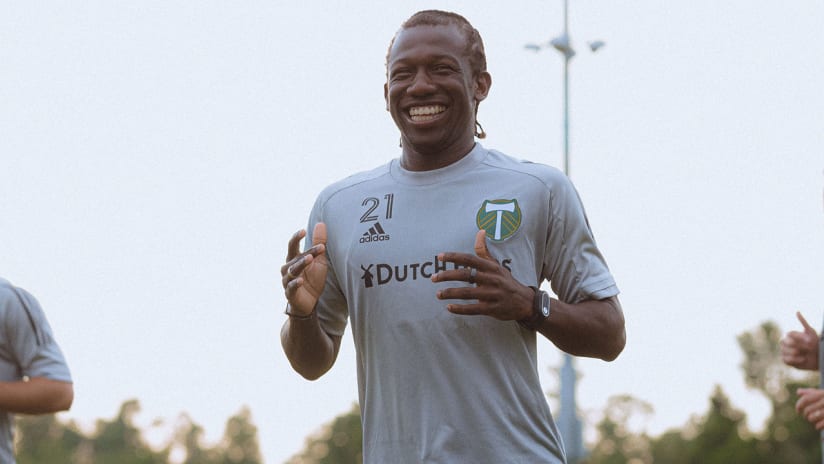ORLANDO, Fla. – It was early in Eryk Williamson’s time with the Portland Timbers, and he was struggling to break into the team’s MLS lineups. He’d taken a leap in the offseason, leaving the University of Maryland to turn professional early, but his playing time was almost exclusively coming with Timbers 2, the club’s second-division team. For somebody in the United States’ youth national team pool, it was a disappointing obstacle, one that led “The Godfather” to check in.
“He realized my frustration,” remembered Williamson, now a starter next to that Godfather, Diego Chara, in Portland’s midfield. “He sat me down. He said, ‘I know you're frustrated, but what can I do as veteran to help you?’ I threw out some ideas, and from that moment on, our relationship flourished.”
This is the Chara Portland sees on a daily basis, somebody who took the field for the 300th time in a competitive match for the Timbers on Saturday in their 3-1 win over New York City FC in the quarterfinals of the MLS is Back Tournament Knockout Stage presented by Audi. For perspective, Major League Soccer plays 34 games each regular season. If a player never missed a game, it would take him 8.8 years to make 300 appearances. Competitions like CONCACAF Champions League, U.S. Open Cup and MLS’s playoffs help speed that along.
For Chara, from his Timbers debut on April 23, 2011 until now, it took 9.3 years to reach the milestone. As Portland’s all-era leader in appearances, Chara has been nearly ever-present since his arrival.
“As a player, I put him on a pedestal in some ways,” the team’s general manager and president of soccer, Gavin Wilkinson, admits, having been asked about his first Designated Player signing. Back then, Chara had just turned 25 years old. He turned 34 this past April.
“When we start talking about all the qualities that we want in a Portland Timbers player,” Wilkinson says, “those encompass his professionalism, respect, hard work, honesty, trust, loyalty – all of these elements along with the quality that he has on the ball, and his understanding of the game.”
Pop culture casts the term “Godfather” as a mafia boss. Chara is anything but. Instead, he’s a founder; a cornerstone; a piece an entire organization is built around; the person every cog can rely on.
That’s what Williamson sees. It’s been two years since his arrival in Portland; two years since his connection with Chara began to form. Now, that connection is helping the 23-year-old into the next phase of his professional career.
“Playing with him, he just makes things easier,” Williamson says. “It's as simple as trying to make sure I'm still motivated, make sure I'm not frustrated if things aren't going my way. It's a long career, and knowing how long his career has been, how successful he's been, he gave me ideas.”
It’s an approach that extends beyond Portland’s locker room, part of the reason the team’s front office “talk[s] about him as [if he was] a staff member,” according to Wilkinson. A small huddle last season, arranged hastily near the Timbers’ training field in Beaverton, Oregon, may be the quintessential example. Chara was the only player among the three people who met, and as part of the inevitable ask of his time, another person offered an apology, trying to mention and then move on from a work issue that was weighing on them.
“No,” Chara interrupted, intently, if politely. “It matters. How you’re feeling always matters.”
Chara’s approach is more than a veteran’s locker-room role. And it’s more than an employee caring about the world around them. How many people in the places you’ve worked have stopped conversations to validate your thoughts?
He connects. He empathizes. He emboldens. In his “how you’re feeling always matters” view, Chara also shares his perspective on sports itself. We’re lucky to be here, he implies. We’re privileged, but along with that privilege comes a responsibility to each other. We owe it to ourselves to recognize our moment, and to make our lives as rewarding as possible.
“For a coach, that’s the type of player that you want,” Timbers head coach Giovanni Savarese says. “He’s always ready. Always executes the plan. Always motivates everybody by being the example … He understands everything, all the time, whatever he needs to do. He's there for the club.”
The most public example of Chara’s understanding has come on the field, where his impact has had to transcend numbers. With only nine goals and 19 assists in his 267 MLS regular-season games, Chara’s contributions are easy for a casual fan to pass over. Such is life in a defensive midfield role. Yet in that role he is the Timbers’ balancing mechanism – the player whose decisions are crucial to maintaining his team’s ability to attack or defend in a given moment. And in the role, Chara may have no MLS parallel.
“When I was outside the Timbers, I used to look at the team, and he was a reference point,” Savarese said, alluding to his time before joining Portland in early 2018. “I told Gavin [Wilkinson] in my [job] interview: if you would have given me a chance to choose a player from within MLS when I was with the [NASL’s New York] Cosmos, it would have been Chara. Because for me, he did everything right.”
His passing accuracy has typically been his most flattering number. The 91.1 percent of passes he completed last season was good for fifth in the league. But his team’s raw results make an obvious number most telling. The Timbers have only won eight of 44 games without Chara in the lineup, and at one point from July 2015 until May 2019, Portland went 24 games without a win (0-14-10) when the Godfather was unable to suit up.
For a team that made the postseason four times in that stretch, it’s a massive disparity. Perhaps it’s also an aberrational one. But from his teammates’ point of view, it’s no mystery why Portland has suffered without Chara.
“For me, he is one of the leaders, one of the builders, one of the workers,” Timbers captain Diego Valeri says. “He has the privilege to be one of the workers that built the Timbers, that created the team’s prestige …
“That's something that describes what Diego means for the club: being capable and having the motivation to put the Timbers at the top; being capable of maintaining that level inside the field.”
The theme of leadership was echoed by another Timbers’ star, Sebastián Blanco.
“He is the kind of leader that is always there with you, who never leaves anyone behind,” Blanco explained. “He never stops. He always has extra time for whoever needs it.”
Blanco and Valeri were also asked to share about their favorite memories of Chara. For Blanco, that memory only goes back two years, to Portland’s Western Conference Championship-clinching performance against Sporting Kansas City in late November of 2018. Soon after halftime, with Portland trailing by a goal, Blanco scored one of the most dramatic goals in Timbers’ history – a dipping shot from long distance that, thanks to the away goals rule, vaulted Portland in front of the favorites.
Even in the face of that goal, one of Blanco’s main memories was a moment he’d later share with Chara.
“We had just won that game and won the conference, and one of the first things I did was hug Chara,” he said. “I keep a photo of that, too. I’ll always remember the fight that we had together, the effort, the peace of mind you have knowing that when you work that hard with someone, good things will always come.
“I remember us saying, ‘you’re welcome,’ to each other. I’ll always be proud to be his teammate.”

Photo: Craig Mitchelldyer / Portland Timbers
Valeri’s favorite memory was captured on camera, too. It was also after a historic win – the Timbers’ MLS Cup final performance in 2015, in Columbus, Ohio. But for Valeri, the importance of that memory is rooted in another moment: one that occurred two years before; happening shortly after the future league MVP arrived in Portland.
“When I arrived here in 2013,” Valeri remembered, “the first couple of weeks weren’t easy. One day later on, I was sitting by Diego’s side – I’d known him maybe a month, by then – and he told, ‘You’re a man of faith. I am, too.’ He brought it up because we were talking about a situation with the team, going into the details of it, and just he said to me, ‘Diego, I pray and I work.’
“I said to myself, ‘I like this guy. I like the way he thinks, his way of feeling and believing. We’re going to do big things together.’”
Fast forward two years, and their big thing had arrived. They were on the field together at MAPFRE Stadium, celebrating an unlikely MLS Cup.
“I have a picture of it,” Valeri says, “where I am celebrating by thanking God. And he's a couple of meters from me, doing the same thing.
“I keep the picture. It’s one of my favorite memories.”
To Portland’s Valeris and Blancos, that’s what Godfather truly means. It’s about a person who, indispensable in the journey, makes the highs even more memorable.
For the Williamsons of the world, the idea Godfather is different. It’s more about Chara’s example.
“He's a role model for me,” Williamson says. “He's someone where I want to follow his path. And when he's done, I want to be the next Diego Chara, if that’s possible.”
Greatness gets implied by 300 games, through both his quality of play and the consistency of it. Yet as great as Chara has been on the field, he’s been even more impactful off of it. Somehow, Chara the player has been transcended Chara the person.
“There's a reason why his teammates will refer to him as the Godfather,” Wilkinson says. “It's a true respect he has, and he deserves it from everyone.”












